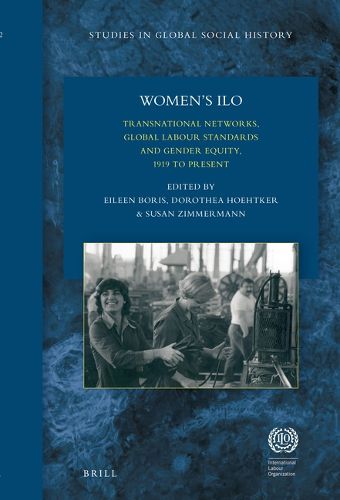Readings Newsletter
Become a Readings Member to make your shopping experience even easier.
Sign in or sign up for free!
You’re not far away from qualifying for FREE standard shipping within Australia
You’ve qualified for FREE standard shipping within Australia
The cart is loading…






What is the place of women in global labour policies? Women’s ILO: Transnational Networks, Global Labour Standards, and Gender Equity, 1919 to Present gathers new research on a century of ILO engagement with women’s work. It asks: what was the role of women’s networks in shaping ILO policies and what were the gendered meanings of international labour law in a world of uneven and unequal development? Women’s ILO explores issues like equal remuneration, home-based labour, and social welfare internationally and in places such as Argentina, Italy, and Ghana. It scrutinizes the impact of both power relations and global feminisms on the making of global labour policies in a world shaped by colonialism, the Cold War and post-colonial inequality. It further charts the disparate advancement of gender equity, highlighting the significant role of women experts and activists in the process.
Contributors are: Paula Lucia Aguilar, Lucia Artner, Eloisa Betti, Chris Bonner, Eileen Boris, Akua O. Britwum, Dorothy Sue Cobble, Dorothea Hoehtker, Pat Horn, Sonya Michel, Silke Neunsinger, Renana Jhabvala, Marieke Louis, Yevette Richards, Mahua Sarkar, Kirsten Scheiwe, Francoise Thebaud, Susan Zimmermann
This is a must-read volume for scholars and students interested in women, labor and international/transnational history. - Judy Tzu-Chun Wu, University of California, Irvine, USA
This fascinating collection of essays assesses the ILO’s role in securing social justice for women workers around the world and asks how that role might change as the world of work is transformed in the next century. - Celia Donert, University of Liverpool
This exciting collection provides a long-overdue state of the art on gender politics and the ILO. It will no doubt be the work of reference on the topic for years to come. - Elisabeth Prugl, Graduate Institute of International and Development Studies, Geneva
$9.00 standard shipping within Australia
FREE standard shipping within Australia for orders over $100.00
Express & International shipping calculated at checkout
What is the place of women in global labour policies? Women’s ILO: Transnational Networks, Global Labour Standards, and Gender Equity, 1919 to Present gathers new research on a century of ILO engagement with women’s work. It asks: what was the role of women’s networks in shaping ILO policies and what were the gendered meanings of international labour law in a world of uneven and unequal development? Women’s ILO explores issues like equal remuneration, home-based labour, and social welfare internationally and in places such as Argentina, Italy, and Ghana. It scrutinizes the impact of both power relations and global feminisms on the making of global labour policies in a world shaped by colonialism, the Cold War and post-colonial inequality. It further charts the disparate advancement of gender equity, highlighting the significant role of women experts and activists in the process.
Contributors are: Paula Lucia Aguilar, Lucia Artner, Eloisa Betti, Chris Bonner, Eileen Boris, Akua O. Britwum, Dorothy Sue Cobble, Dorothea Hoehtker, Pat Horn, Sonya Michel, Silke Neunsinger, Renana Jhabvala, Marieke Louis, Yevette Richards, Mahua Sarkar, Kirsten Scheiwe, Francoise Thebaud, Susan Zimmermann
This is a must-read volume for scholars and students interested in women, labor and international/transnational history. - Judy Tzu-Chun Wu, University of California, Irvine, USA
This fascinating collection of essays assesses the ILO’s role in securing social justice for women workers around the world and asks how that role might change as the world of work is transformed in the next century. - Celia Donert, University of Liverpool
This exciting collection provides a long-overdue state of the art on gender politics and the ILO. It will no doubt be the work of reference on the topic for years to come. - Elisabeth Prugl, Graduate Institute of International and Development Studies, Geneva